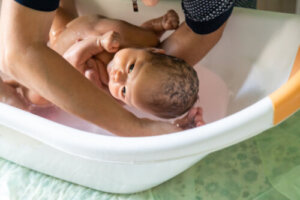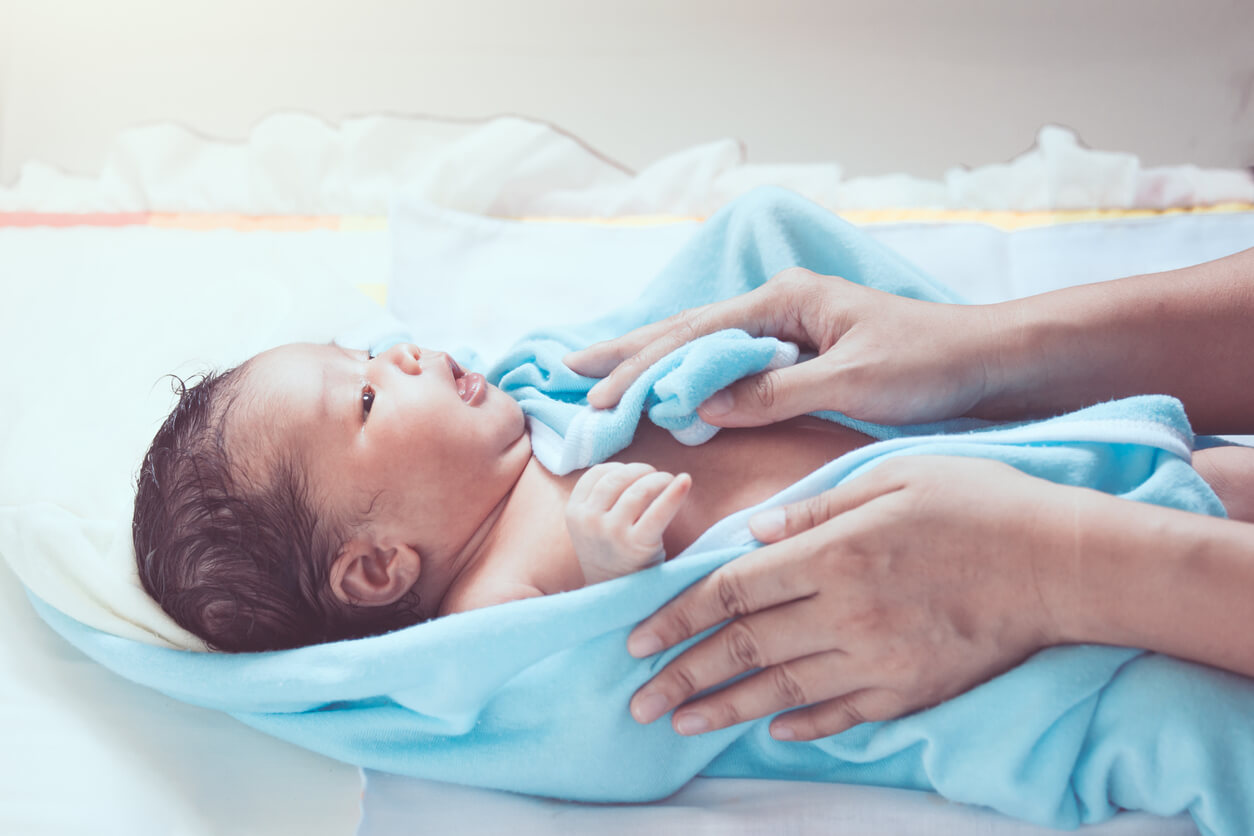10 Mistakes When Bathing Your Baby


Written and verified by the dermatologist Maria del Carmen Hernandez
The moment when bathing your baby is one of the most desired experiences for parents. At the same time, it strengthens the bond between both parties, while it relaxes and brings pleasure to the newborn.
The most common mistakes when bathing your baby
It’s normal for parents to make certain mistakes during the baby’s bath, especially first-timers, as sometimes uncertainty can be overwhelming.
Here are the 10 most common mistakes that keep bathing your baby from being a stress-free and relaxing experience for you and your baby.
1. An excess of hygiene products
The use of cosmetic and hygiene products such as soap, shampoo, gel, or creams with too many chemicals isn’t recommended, as they can cause skin reactions or allergies. In fact, soap should not be applied to the face.
The Jornal de Pediatria recommends the use of neutral soap to avoid altering the pH of the baby’s delicate skin.
2. Not controlling the water temperature when bathing your baby
The skin of newborns is much more sensitive to temperature changes. Therefore, it’s always important to regulate the temperature of the water in the bathtub, as it should never be too hot or too cold.
Likewise, the appropriate water temperature for bathing your baby is around 98.6 °F. Below these values, the immune system may be affected and be more prone to getting sick.
3. Neglecting your baby at bath time
Never take your eyes off the baby, not even for a second, whether in the bathtub or in bed, as accidents can happen. Leaving them alone without someone’s supervision is an imprudence that can lead to drowning, falls, electrocutions, or other serious events. For this reason, all the elements that are going to be used should always be available beforehand, including the following:
- Diapers
- Towel
- Clothes
- Oils or creams
You may be interested in: How to Wash Your Baby’s Hair and How Often

4. Drying your baby incorrectly
Another of the most common mistakes when bathing your baby is not drying them properly or completely. That’s to say, you need to make sure that no moisture is left between the various folds of the body.
Babies’ skin is very sensitive, so it’s not advisable to dry it by generating friction, but with gentle taps so as not to cause damage.
5. Using inappropriate items
Swabs or cotton swabs should never be used and inserted into the baby’s ears to dry or clean them. In addition, it’s essential that any electronic device is far away to prevent it from falling into the bathtub.
Sponges should be soft and should be used without generating too much force when rubbing in order to avoid causing skin reactions.
6. Excessive bathing time
Baths for newborns should be short and quick. Although there’s no fixed time limit, don’t allow the time to extend too long to prevent the water from getting cold.
Also, long baths can cause skin irritation or aggravate atopic dermatitis.
7. Be careful with the umbilical cord
Ideally, wait until the umbilical cord falls off before bathing your baby for the first time. However, this time may vary in different infants.
It’s even advisable to postpone the cleaning of the umbilical cord until after the bath. In other words, it shouldn’t be rubbed because it could be injured. On the contrary, when newborns still have the umbilical cord, it should be washed every day with soap and water.
The American Academy of Pediatrics concludes that bathing the baby before the cord falls off can leave it moist and predispose it to infections.

8. Properly prepare the bathtub
The bathtub should be washed before and after bathing your newborn. In fact, bathing your baby outside the bathtub, on a surface where the infant isn’t in the water, is another of the most common mistakes. In this context, the child can get cold more easily and suffer health complications.
9. Everyone involved should be comfortable
Placing your newborn in positions that aren’t the correct ones inside the bathtub can lead to slips. This is another of the most frequent mistakes when bathing your baby. Always watch the head and neck of the newborn and avoid getting soap in their eyes.
10. Sanitize the diaper area beforehand
It’s important to bathe your baby with a clean diaper area to avoid contaminating the water when putting the baby in the bathtub. In the bathtub, always hold the baby firmly so as not to cause an accident.
The water level in the bathtub shouldn’t exceed the baby’s waist when seated or their shoulders when lying down. This minimizes the chances of accidental drowning.
Bathing your baby should be a moment of enjoyment and pleasure
Insecurity can take over when it’s time to bathe your baby. However, with caution, patience, tenderness, and love, fears can be allayed and bath time can be a pleasurable experience for both of you.
In conclusion, bathing should be a time for sharing with your baby and for relaxation.
The moment when bathing your baby is one of the most desired experiences for parents. At the same time, it strengthens the bond between both parties, while it relaxes and brings pleasure to the newborn.
The most common mistakes when bathing your baby
It’s normal for parents to make certain mistakes during the baby’s bath, especially first-timers, as sometimes uncertainty can be overwhelming.
Here are the 10 most common mistakes that keep bathing your baby from being a stress-free and relaxing experience for you and your baby.
1. An excess of hygiene products
The use of cosmetic and hygiene products such as soap, shampoo, gel, or creams with too many chemicals isn’t recommended, as they can cause skin reactions or allergies. In fact, soap should not be applied to the face.
The Jornal de Pediatria recommends the use of neutral soap to avoid altering the pH of the baby’s delicate skin.
2. Not controlling the water temperature when bathing your baby
The skin of newborns is much more sensitive to temperature changes. Therefore, it’s always important to regulate the temperature of the water in the bathtub, as it should never be too hot or too cold.
Likewise, the appropriate water temperature for bathing your baby is around 98.6 °F. Below these values, the immune system may be affected and be more prone to getting sick.
3. Neglecting your baby at bath time
Never take your eyes off the baby, not even for a second, whether in the bathtub or in bed, as accidents can happen. Leaving them alone without someone’s supervision is an imprudence that can lead to drowning, falls, electrocutions, or other serious events. For this reason, all the elements that are going to be used should always be available beforehand, including the following:
- Diapers
- Towel
- Clothes
- Oils or creams
You may be interested in: How to Wash Your Baby’s Hair and How Often

4. Drying your baby incorrectly
Another of the most common mistakes when bathing your baby is not drying them properly or completely. That’s to say, you need to make sure that no moisture is left between the various folds of the body.
Babies’ skin is very sensitive, so it’s not advisable to dry it by generating friction, but with gentle taps so as not to cause damage.
5. Using inappropriate items
Swabs or cotton swabs should never be used and inserted into the baby’s ears to dry or clean them. In addition, it’s essential that any electronic device is far away to prevent it from falling into the bathtub.
Sponges should be soft and should be used without generating too much force when rubbing in order to avoid causing skin reactions.
6. Excessive bathing time
Baths for newborns should be short and quick. Although there’s no fixed time limit, don’t allow the time to extend too long to prevent the water from getting cold.
Also, long baths can cause skin irritation or aggravate atopic dermatitis.
7. Be careful with the umbilical cord
Ideally, wait until the umbilical cord falls off before bathing your baby for the first time. However, this time may vary in different infants.
It’s even advisable to postpone the cleaning of the umbilical cord until after the bath. In other words, it shouldn’t be rubbed because it could be injured. On the contrary, when newborns still have the umbilical cord, it should be washed every day with soap and water.
The American Academy of Pediatrics concludes that bathing the baby before the cord falls off can leave it moist and predispose it to infections.

8. Properly prepare the bathtub
The bathtub should be washed before and after bathing your newborn. In fact, bathing your baby outside the bathtub, on a surface where the infant isn’t in the water, is another of the most common mistakes. In this context, the child can get cold more easily and suffer health complications.
9. Everyone involved should be comfortable
Placing your newborn in positions that aren’t the correct ones inside the bathtub can lead to slips. This is another of the most frequent mistakes when bathing your baby. Always watch the head and neck of the newborn and avoid getting soap in their eyes.
10. Sanitize the diaper area beforehand
It’s important to bathe your baby with a clean diaper area to avoid contaminating the water when putting the baby in the bathtub. In the bathtub, always hold the baby firmly so as not to cause an accident.
The water level in the bathtub shouldn’t exceed the baby’s waist when seated or their shoulders when lying down. This minimizes the chances of accidental drowning.
Bathing your baby should be a moment of enjoyment and pleasure
Insecurity can take over when it’s time to bathe your baby. However, with caution, patience, tenderness, and love, fears can be allayed and bath time can be a pleasurable experience for both of you.
In conclusion, bathing should be a time for sharing with your baby and for relaxation.
All cited sources were thoroughly reviewed by our team to ensure their quality, reliability, currency, and validity. The bibliography of this article was considered reliable and of academic or scientific accuracy.
- Dry care versus antiseptics for umbilical cord care: A cluster randomized trial. [Internet] Disponible en: https://publications.aap.org/pediatrics/article-abstract/139/1/e20161857/51678/Dry-Care-Versus-Antiseptics-for-Umbilical-Cord
- Mendes BR, Shimabukuro DM, Uber M, Abagge KT. Critical assessment of the pH of children’s soap. J Pediatr (Rio J). 2016 May-Jun;92(3):290-5. doi: 10.1016/j.jped.2015.08.009. Epub 2016 Feb 1. PMID: 26844391.
- Bathing your baby. [Internet] Disponible en: https://www.healthychildren.org/English/ages-stages/baby/bathing-skin-care/Pages/Bathing-Your-Newborn.aspx
This text is provided for informational purposes only and does not replace consultation with a professional. If in doubt, consult your specialist.








